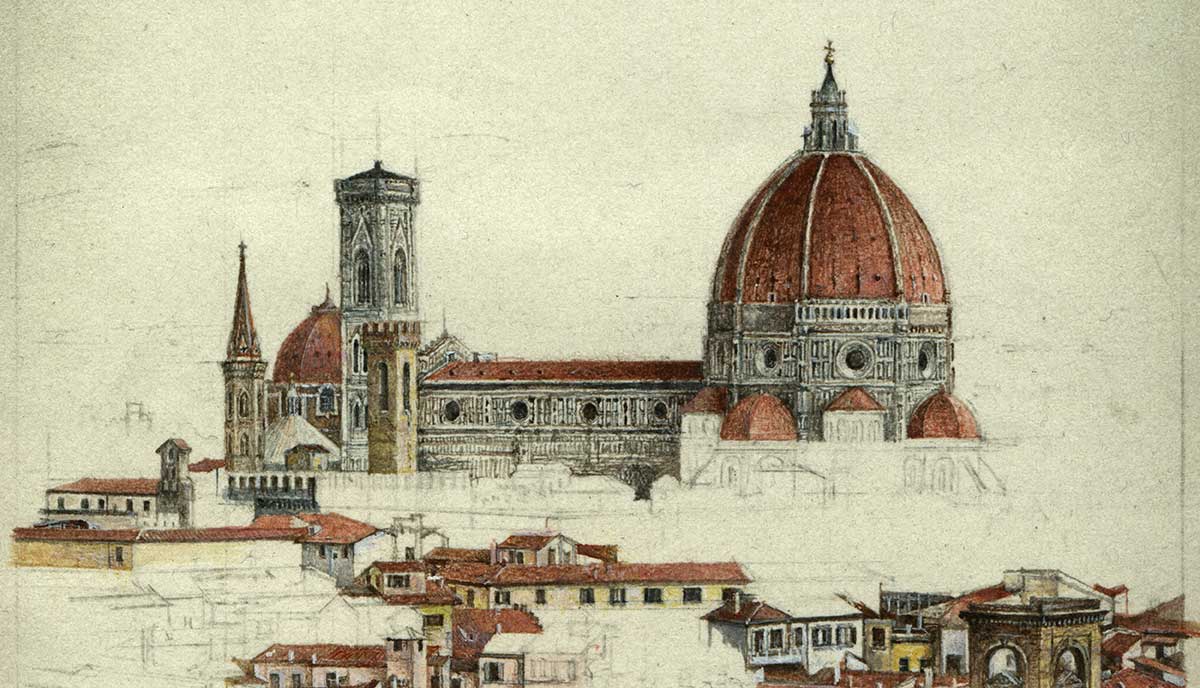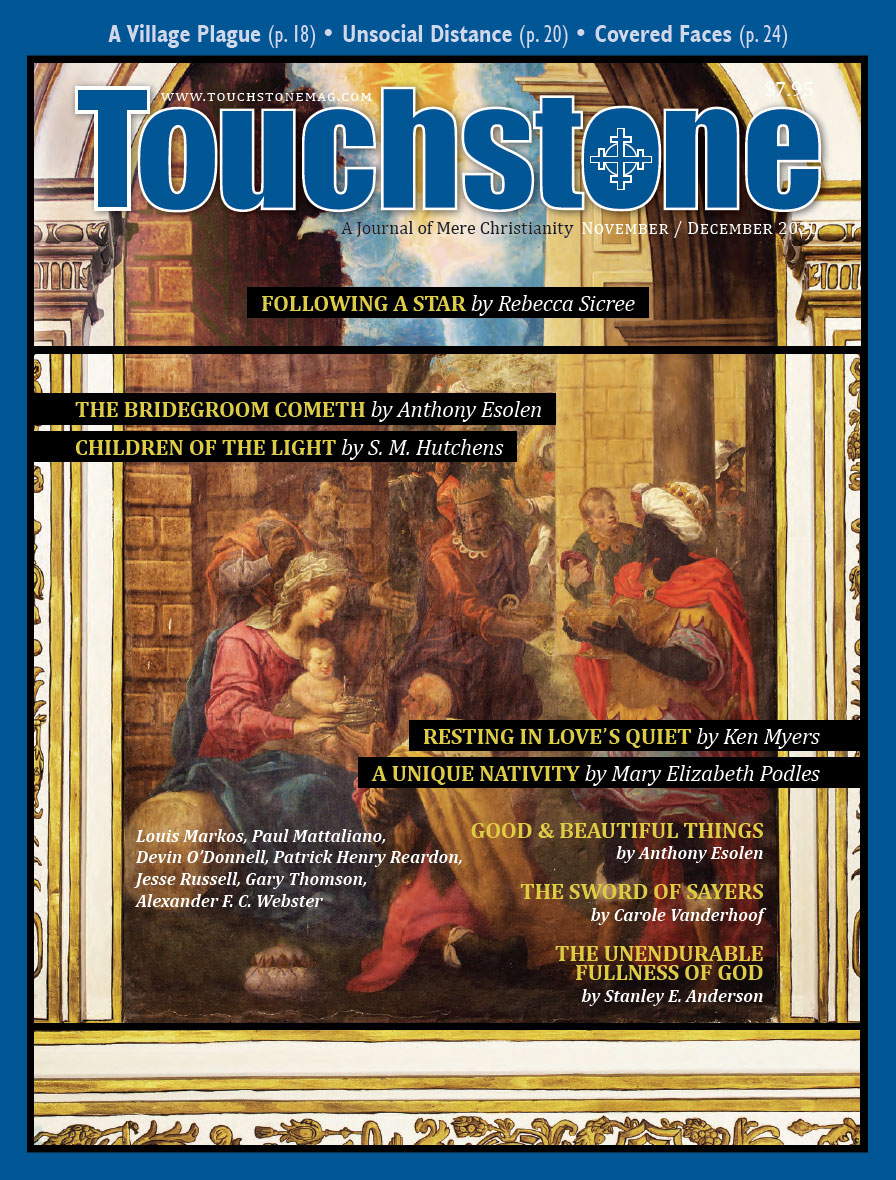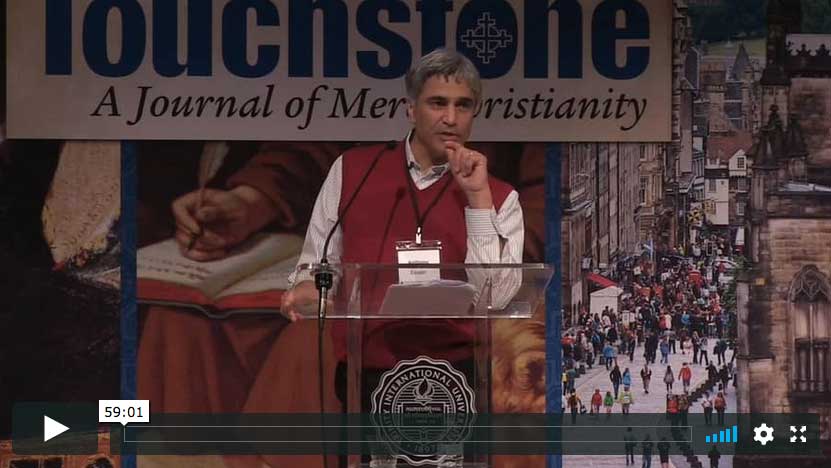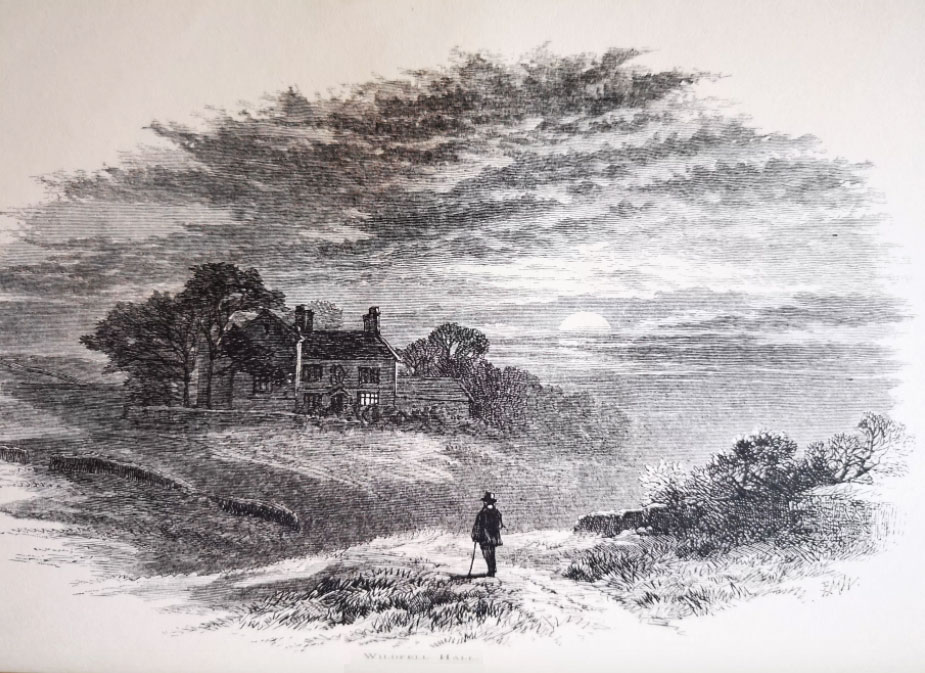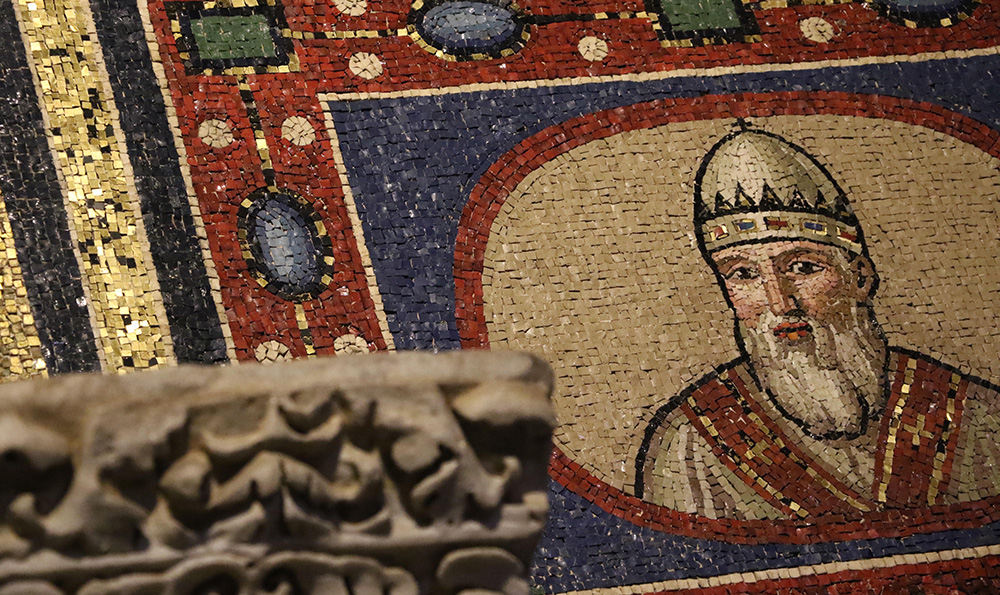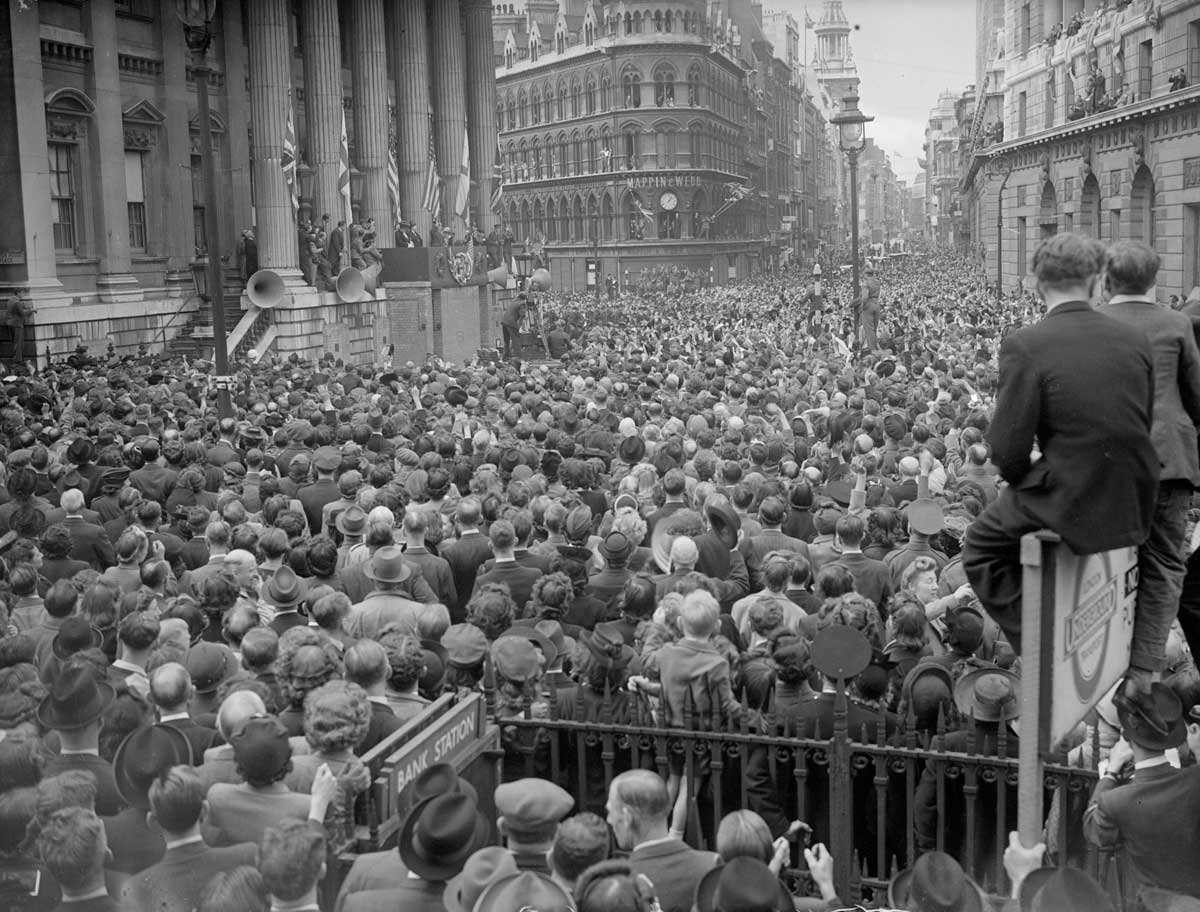Conference Talk
The Ugly & the Good
Why We No Longer But Still Could Have Beautiful Things
When I was a young man of 24 years, in the middle of a brief and not entirely happy flirtation with what is called "liberalism," I remember thinking the most impertinent and self-important thought, as I stood in the gallery of the cupola of the cathedral in Florence, gazing out upon the tiled faces of its octagonal dome that towers more than 350 feet above the earth. The thought was not about scaffolding, or pulleys, or sledges heaped with tiles. Those are pertinent and practical things, and at that time I had not yet been married or owned a house, so I was far from knowledge of carpentry and masonry. In that regard I might as well have been a soft-handed professor of women's studies, bemoaning in smart dress the unfairness of it all, that men like both of my grandfathers breathed coal dust in the mines for ten hours a day while their wives had to stay home and miss out on the glamour of a claustrophobic nervous breakdown, in one case, and a broken neck in the other.
No, I'm ashamed to say that my thought parroted the demon that preoccupied Judas, when he saw the woman break open the jar of precious ointment to anoint the feet of Jesus while she wept. "This could have been sold for three hundred pieces of silver, and the proceeds redistributed to the poor," said he whom St. John, who was in a position to know, called a thief. Such a waste. Then the giddiness of that height made me consider how many boys and men lost their lives while building those churches. It spoiled, just a bit, my appreciation of its magnificence. Yet something Italian still must have been running in my veins, because I sought out those cathedrals and their bell towers and galleries and domes even so, and I was glad that they had gathered their towns roundabout them. In my best moments since, I can imagine myself working a tile into place, hanging up there by a rope and a board, surrounded by the gruff chatter of workmen, and the greater dome of the sky above.
Glorious Folk Art
I've come to see the medieval cathedrals of Europe as the most glorious works of folk art the world has ever known. For that's what they are. They rose up as a lofty expression of the piety of ordinary people, the work of hundreds of men's hands, digging the deep cavity for the foundation, hewing and setting delicate half-ton stones without mortar, mixing colors for paint or the glazing of windows, searching the forests for the tallest oaks to fell and to carve into beams to span a roof; far more kinds of work than I know and can name.
And it was in the most obvious sense a work of faith. The funds were sure to run out, and then many years might pass during which the building remained incomplete. Raising up one of those structures required trust in your grandson to complete what you worked on and what your grandfather began. We have nothing comparable now.
And they put themselves into those buildings. I mean that literally. You will see many a window featuring ordinary workmen: bakers, weavers, smiths, coopers, carpenters. There was a homely and healthy town rivalry in their enthusiasm, too. Everybody wanted a church that was finer and taller than the one in the town up the river. Sure, that meant also that a steadier stream of pilgrims—for medieval man was a pilgrim, not a tourist—would come to your town, and they would need food and drink and lodging. But of course the vast expense would never be recovered by the same people who contributed at first, and nobody expected as much. To ask, then, why they did such a thing, rather than keep their gold hidden in a hole in the floor, is to ask what is beside the point. They did it because they loved doing it. They were free.
True Freedom
I intend that word in its old Germanic sense. To be free is not, O modern man, to be rid of all claims upon your love, your duty, your person, and your substance. If that were true, then Charles Dickens crafted a truly blithe and free spirit in the unregenerate Ebenezer Scrooge, crouching alone in his dismal flat and eating gruel gone sour. If you are talking about freedom and you are not talking about love and devotion, then you are not talking about freedom at all; you are talking about moral license, or a permission guaranteed by statutory law, that you may in some regard do exactly as you like, which may include gazing endlessly at evil pictures on your computer screen, and thus transforming yourself, cell by cell and pulse by pulse, into a thing, an automaton. Even at Magdalen College, where by the ineffable mercy of God I now teach, one of my students expressed surprise that I did not define freedom in this negative fashion. "What can freedom then be?" he asked, genuinely wanting to know.
I gave him a definition that every poet and thinker in the Middle Ages would have accepted, and likewise every Christian, whether Catholic or Protestant, in the Renaissance. I said that freedom is the unimpeded capacity to attain to the perfection proper to the kind of creature you are. But since man is made in the image of the God who is a three-personed communion of love, his perfection, the enlargement of his soul, can only come by means of a gift, by the gift of grace from God, which enables him to make of himself a gift to others. There is no truly human freedom without grace, and the love that is its proper response.
In this sense the people who built the cathedral of Florence were free, and modern man is not. They gave of themselves with energy, with a childlike thoughtlessness, bringing forth grandeur and beauty, and I, flirting with liberalism, could only close my fists in my pockets and grumble about expenses. Nor did I consider, while I was grumbling, that the work of art wherein I stood was a gift, not only from but also for the poor. Our poor watch bad television and listen to bad music and cover their flesh with bad tattoos. Their poor built, worshiped in, and dwelt in the kindly and homely shadow of indescribable beauty. If you are wealthy now, you can travel to Florence and pretend to enjoy works of art preserved in museums, those morgues complete with glass cases and formaldehyde. The poor of Florence in the time of Dante did not need to wait for the special days when they could enter the museum free of charge, after standing in line for hours. They need only have gone into any of their churches to pray.
Lost Desire for Beauty
My question now, after all these years, is one to which I have found no satisfying answer. It is not, "Why did the medieval Florentines build the great Duomo?" I think I know why they did that. My question is, "Why do modern Americans not build it?"
The answer cannot be that we lack the means. We may be poorer in soul than medieval man was, less apt to celebrate or even notice a feast, and far less attuned to the sweet or terrible beauty of the natural world around us. We may be poorer in soul, but we are not poorer in means, and we, unlike them, have diesel-powered pile drivers, backhoes, and cranes. No, I fear that we do not build such beautiful things because we do not want them. We don't care enough. We are tight-fisted with our devotion.
We teach our children to be so. In every culture known to man until this thing of ours, youth was preeminently the time for love. But we teach young people that love is a fool's errand until your accounts are settled. This is what is called "realism," which turns away demurely from the proper passions of young men and women, who should be moved to give themselves to one another in marriage. We are prudes in all the wrong things. Porn will not raise an eyebrow, but an early marriage, there you're talking scandal.
We do not have beautiful things, because we do not want them enough. But why do we not want them? Let me suggest three reasons. Each derives from a malady characteristic of modern man, which is to say the liberal man of the masses, who calls himself a liberal if he wants to appropriate other people's money for the cure of social ills caused by his own liberal obliteration of tradition, his scorn for the home and its authority, and his sexual preachments unmoored from the reality of man and woman and child; or who calls himself a conservative if he is ten years behind his neighbor in those regards.
The Three Reasons
The three reasons are these: We do not have beautiful things because we have been taught to value things and even persons mainly for their utility. We do not have beautiful things because our sense of beauty has been reduced to the decorative and pretty, or to garish scenes on an advertisement for tourists; beauty is a commodity, cheap or expensive, depending on whether your taste runs to costume jewelry or diamonds from De Beers. We do not have beautiful things, because we have forgotten how best to give praise to God, who is himself Beauty.
Let us take these reasons, which are related to one another, one at a time.
1. Utility
First, the business of utility. There is nothing wrong with a thing's being useful to man. I am trying in our new home to find a place for our six thousand books, or to make new places for them, and that has required me to break out my table saw, to buy nails and brackets from the hardware store, and pine studs and plywood from the lumberyard. The saw works because its blade is made of steel whose iron ore had to be taken from the earth by men in charge of machines, even sometimes such old machines as picks and shovels. The wood is available because men have cut down trees in the forests of Maine, with chainsaws and axes, and the rough timber has then been hewn at sawmills into sections of various dimensions fit for the use to which they would be put.
But notice that the train of work does not end there. It cannot end there. What is useful is so because it is oriented toward something else, and eventually that something else must be desired for its own sake, because it is good and beautiful and needs no justification beyond itself. And here we judge that people can get matters wrong, if they are not attuned to the goodness and the beauty in such ends.
If a young man strives to get a well-paying job to support his wife and family in a becoming way, we praise him, and we understand that he has rightly subordinated the utility of his work to the good of things that require no justification—the good of persons and their love. If, however, he hunts down a rich woman so that he will not need to work at all, we sense that he has reversed the order of goods and has turned a human being into a device for procuring his pleasures. She is not a robot, not yet anyhow, but as far as his hedonism is concerned, she is already halfway along.
Our trouble now is that we do not define our worth according to reality, which we find admirably expressed in Scripture, when God says, "Let us make man in our image." It is blasphemous or absurd to ask, "What is it for, to what use may it be put, this being made in the image of God?" But we define or measure our worth as if we were tools or machines, gears in an economic or social rig.
No one would ask of someone planting lilies, "What are you going to do with those?" But we do ask it of ourselves, as if we were less than the lilies. Hence we find young women who cannot imagine not being chained to work, because then they must confront the mystery of this life more directly and honestly than is usual. They have bought stock in the utility company, following their brothers in an error that is not otherwise proper to them. This they call "leadership," a flight from liberty and from the transforming power of personal love.
2. Mere Decoration
If you conceive of yourself in mechanical terms—you need fuel, you are burned out, you are about to blow a gasket, you are spinning your wheels, you have gotten a makeover, you are more productive than you used to be, your output is astonishing, you are wired for success, someone has thrown a wrench into your works—you will not be likely to understand the force of beauty, and you will tend to value it only insofar as it assists the work or makes the factory, including that factory lounge we call the home, a little more pleasant.
Beauty, then, is merely decorative. You may have good taste or bad taste; you may like Rembrandt or Thomas Kinkade; you may listen to Mozart or the Beach Boys; but the key thing is that you do not take those things really seriously. So you listen to the wheezing and straining of popular vocalists while you are pumping gasoline, and it does not strike you as a bizarre thing, this debasing of music, turning it into mood-sound.
Men in particular give over the making of beautiful things, and do not notice or care that the songs they sing in church, for example, are at best shallow and merely pretty, and at worst garish, mawkish, sentimental, saccharine, and inept. Utilitarians produce poor art or none at all. If you look from a hilltop at an Italian town, you can tell immediately what part was constructed after the Second World War. It is the part unrelieved by imagination, devotion, and beauty. It is the part that looks as if the only shape man has ever known was a rectangle, and the only color the color of dust.
3. Forgetfulness of God
But all of this returns us to God, the source of beauty, whom modern man longs to forget. It wasn't possible for medieval man to forget God. He could rebel against him, he could sin incessantly, but he could not forget him. He reckoned time by the canonical hours of prayer. His calendar was a drama of saints and of the magnalia Christi. He rode on the plains and saw, twenty miles away, the spire of a cathedral, as Chesterton said, thrust like a lance into the side of Christ. He heard in the dark hours of the morning the bells from the monastery nearby, as the monks rose to sing morning-song to the Lord.
We reckon time by standardized numbers that have only a partial relationship to the apparent movement of the sun, and no relationship at all to realities beyond the sun or in the deep interior of the soul. If we ride on the plains, we see shopping malls and gas stations and factories, not churches. We have no real holy days anymore. My Catholic bishops themselves are suspicious of them, turning Ascension Thursday into Ascension Sunday, doing their best to whitewash every mysterious color of the story of salvation, to flatten its majestic mountains and level its valleys with sand and gravel and other fill.
The Psalmist says, "I rejoiced when I heard them say, Let us go up to the house of the Lord." That sentiment is foreign to modern man. He cannot imagine being eager to enjoy the beauty of the Lord in his holy temple. Christians breathe the same stifling air, and say things that would strike St. Francis of Assisi with astonishment—for instance, that it does not matter at all whether the church of God is decked with beauty. Francis was a poet, a lover of the natural world, a poor man who wanted the church to be rich indeed. He was a man of lively and irrepressible imagination. What are we?
Reclaiming & Healing the Imagination
Let me not be misunderstood. I am not just saying that the art we now produce—and I am thinking particularly of the art within and around the church and our lives of prayer—is inferior to the art of the Middle Ages. It is inferior, but that's not the point. The point is rather that the life of the imagination and the life of the soul were for the men of the Middle Ages indistinguishable from one another, but for us it is not so. We do not see that man, made in the image of God, is what Tolkien called a sub-creator, a maker of images, whether in paint or stone or words or sound, and that our images ought to revel in the beauty of God's world and of God himself, and thereby probe the mystery of man, called by God but setting himself in enmity against God, living and sinning and repenting and dying, and living again in the mercy and the grace of Christ.
Name for me the ordinary people who build the modern Notre Dame de Paris. You cannot, because there are no such. Name for me the ordinary people who invent polyphonic singing and spread it from Kiev to Lisbon. You cannot, because there are no such. Our churches are empty because our souls are hollow. Our minds are foolish, and our imaginations are morbid or dead.
I cannot stress this emphatically enough. If a man is wheezing, his lungs filled with fluid, you do not ask what his exercise regimen should be; your first duty is to clear his lungs so he can breathe. If a man is limping on a broken ankle, you do not sign him up for the infantry. Your first duty is to set his ankle so it may heal. In a time when the imagination is morbid or dead, you need to see to that, right away.
Satan says, "Give me the imagination, and you can take all the rest." That is as much as to say, "Give me the heart, and you can have every other organ." A fine deal! What good is it to have the fingers and the toes, if the heart is hard or weak or dead? We must take back the heart, the chest, the seat of proper passions, which is to take back from Satan those commanding heights of the imagination, which is to reject the errors I have mentioned and to repair the harm they have done. We must not value the useful over the beautiful. We must not reduce beauty to a commodity. We must not forget that our experience of beauty should lead us back to the source of beauty, who is God.
Both Easier & Harder
Now this is in a sense both easier and more difficult than many another healing enterprise to which we must give ourselves. It is easier, because so many of the treasures of our heritage lie within our reach. There is no ecclesiastical or statutory law forbidding us to read good books, to sing good songs, to learn again how to pray the hours of the divine office, and to build good schools and hire good teachers to work in them. We are like the tenants of an ancient house filled with priceless art and musical instruments and manuscripts, who would be the wisest people in the world if they would get up from their chairs and open the closets and the trunks. What we lack is not the means, but the will, and perhaps the teachers who can show us what we have and why it is grand and worthy of our cherishing.
But it is also harder. One reason is that, having accepted too much of the basic assumption of the utilitarians around us—that society is a vast machine to be designed and oiled and run by smart people armed with efficient laws—we expect from political action what it cannot deliver.
We must have political action; we have been attacked incessantly from that flank, and though we should never hope for too much from wise politicians and good laws, there is a great deal more to fear from stupid politicians and bad laws. One wrecking ball can ruin in a day what it took many men years to build. Consider how quickly marriage began to fall apart as soon as the liberals, some of them calling themselves conservative, allowed people to break their vows with a flagrancy that would land them in prison if they did something comparable to their shareholders or business partners. So we must fight on that front.
But you cannot restore cultural soil by political action. You can at best craft wise laws that will subtly encourage the cultural recovery, or that will give you a breathing space for health and good sense to do their work. But the work is not electoral or legal. You cannot restore by mechanical means the nutrients of a depleted soil. You cannot restore cultural memory or cultural flourishing in a day, or a year. Man has not invented and never will be able to invent a machine for the mass production of solemnity, or joy, or wonder. What was built up over generations will require patient tilling to recover. We cannot resurrect a bygone time. But if a Christian culture of any sort at all is to grow, the things that make culture possible—the topsoil, if you will—have to be in place.
The Most Immediately Available Arts
Here song and poetry must play the lead. As soon as I say so, I am afraid that I lose half my audience, because their experience of sacred song is that of the sickly sweet and effeminate, and their experience of popular song is, nowadays, that of semi-sleazy women whose voices sound as if they were in a hospital bathroom straining to relieve themselves. Their experience of poetry is nil, or worse—they see in their mind's eye some poet reciting his work, trying to be grave and profound, and not all the psychoactive drugs he ingests can bring him to conceive of a single line of English that makes any sense. What a shame that is.
For song and poetry are the most immediately available of all the arts, requiring only a human mind and a human voice. If you want a Rembrandt, you have to go see it, or carry a copy with you under your arm while you avert your eyes from the glare of the policeman. Grand pianos, with Van Cliburn sitting at them, are not to be found on every street corner. You cannot from your porch in New Hampshire gaze upon the great arms that Bernini conceived for St. Peter's piazza, extending in the shape of a key to embrace the thousands who would come to worship there.
But anyone can possess a song or a poem. If you have a voice, you can sing, and if you have a mind, you can remember what you sing. If you have a voice, you can utter a poem, and remember what you have uttered. In a way, you can best possess a song only by singing it, and a poem only by giving it the performance of your mind and heart and voice and body. Song and poetry should be the most democratic of the arts, more truly by the people, of the people, and for the people than anything else in our experience.
Working on the Sure Foundation
Our enemies testify by their hatred to the power of song and poetry. They, not we, have galvanized a Common Corpse to jerk its limbs into action and lay its cold hands upon the minds of our young people. During the season of youth, when boys and girls should most heartily be learning how to love and what to love, they are starved of the beauty of song and poetry, and instead are compelled to ingest cardboard and sawdust—"informational texts," as the ugly slang has it, things that aren't woven with enough craft to be called texts, and that don't possess enough truth or form to be called informational.
And how do the leaders of many a Christian school respond? In a hopeless frenzy. If the utilitarians down the street are ruining their children's souls with three treadmills, well then, by God, we must ruin them with four. If our enemies sense, though they can hardly put it in words, that the land of beauty is dangerous indeed, like climbing Mount Hermon when the snow dusts its shoulders, and therefore we must direct our children's eyes toward the machines of politics, sex, and the amassing of power and prestige, well then, by God, we must go ahead and boast that we are even better at keeping our children safe from wonder than they are. They do God the dishonor of pretending that he is not there, while secretly fearing that he is. We will outdo them in that, too. We will do God the dishonor of pretending that he is where we put him, and where we will see to it that he stays.
What then shall we do? We live in the midst of a city blown to bits. The rubble must be cleared, the sewers cleaned, the sick tended, the children watched, the people fed, and the things of man built up once more, on the sure foundation of faith in Christ. We cannot do this as if it were a job to which machines could be applied. Even were it so, we ourselves who would run those machines are ill. We are a part of the rubble and the sewers, the disease, the inattention, the hunger, and the ruin.
We must be honest with ourselves. We must build new schools, and who will teach in them, unless we become the kinds of people who would do so, or who would willingly profit by them? That requires a turn, a conversion, a mending of our foolish ways. No one is exempt. Nor is there one moment to lose. The acceptable time is now, and has always been. Souls hang in the balance, our own as well as anyone else's. Will not the Lord give us a second chance? He has given us seventy times seven chances already.
To work, boys—for the night cometh, when no man can work. And let us go to it with all the cheer of that true and only Sabbath, when all labor and all human art will meet their consummation in the beauty of the Lord.
Anthony Esolen is Distinguished Professor of Humanities at Thales College and the author of over 30 books, including Real Music: A Guide to the Timeless Hymns of the Church (Tan, with a CD), Out of the Ashes: Rebuilding American Culture (Regnery), and The Hundredfold: Songs for the Lord (Ignatius). He has also translated Dante’s Divine Comedy (Random House) and, with his wife Debra, publishes the web magazine Word and Song (anthonyesolen.substack.com). He is a senior editor of Touchstone.
subscription options
Order
Print/Online Subscription

Get six issues (one year) of Touchstone PLUS full online access including pdf downloads for only $39.95. That's only $3.34 per month!
Order
Online Only
Subscription

Get a one-year full-access subscription to the Touchstone online archives for only $19.95. That's only $1.66 per month!
bulk subscriptions
Order Touchstone subscriptions in bulk and save $10 per sub! Each subscription includes 6 issues of Touchstone plus full online access to touchstonemag.com—including archives, videos, and pdf downloads of recent issues for only $29.95 each! Great for churches or study groups.
Transactions will be processed on a secure server.
more on culture from the online archives
more from the online archives
calling all readers
Please Donate
"There are magazines worth reading but few worth saving . . . Touchstone is just such a magazine."
—Alice von Hildebrand
"Here we do not concede one square millimeter of territory to falsehood, folly, contemporary sentimentality, or fashion. We speak the truth, and let God be our judge. . . . Touchstone is the one committedly Christian conservative journal."
—Anthony Esolen, Touchstone senior editor





